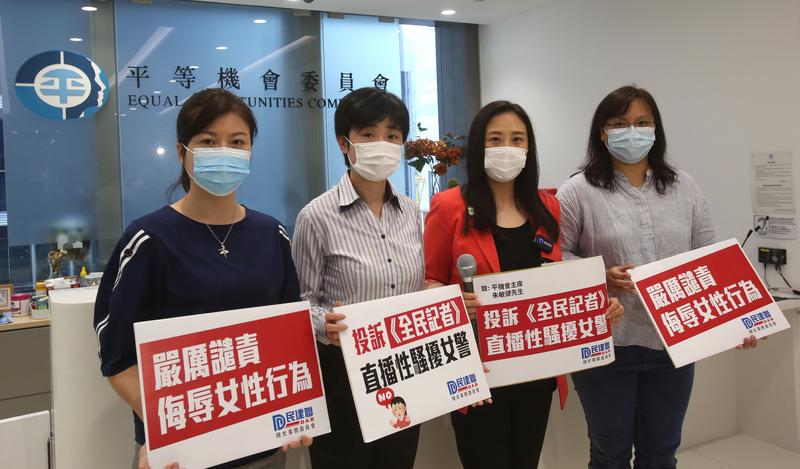 Lawmaker Elizabeth Quat Pui-fan (second right) and members of Democratic Alliance for the Betterment and Progress of Hong Kong rally at the Equal Opportunities Commission on Wednesday. They condemned Civilian Reporters, a web-based media outlet, for insulting female police officers who were deployed to a protest in Mong Kok on Sunday. (PARKER ZHENG / CHINA DAILY)
Lawmaker Elizabeth Quat Pui-fan (second right) and members of Democratic Alliance for the Betterment and Progress of Hong Kong rally at the Equal Opportunities Commission on Wednesday. They condemned Civilian Reporters, a web-based media outlet, for insulting female police officers who were deployed to a protest in Mong Kok on Sunday. (PARKER ZHENG / CHINA DAILY)
A growing number of teenagers resort to violence because of misinformation spread online and the incitement of political activists, according to a majority of those polled in a survey.
Legal expert and lawmaker urged the government to crack down on fake news, which is rife online, especially on social media platforms.
When fake news or information incites violence, existing laws are already in place to punish such behavior. But when it’s simply fake but non-violent information, new legislation is needed to regulate
Ronny Tong Ka-wah, barrister and member of Hong Kong’s Executive Council
More than 70 percent of the 1,385 polled in the survey — conducted May 5 through to Sunday, and released on Wednesday — believe fake news has played a major role in inciting young people to disrupt law and order in the city.
Most of the surveyed residents pinned the blame on fake news, particularly that published on different social media platforms while violent protests continue. Such news stirred hatred of the government and the police force, leading to prolonged protests and escalating violence, they opined.
On May 5, police revealed that about 41 percent of the total 8,001 people arrested for roles in unlawful protests from June through mid-April were students.
The staggering number is a wake-up call to society, lawmaker Chow Ho-ding said, adding that more youngsters are now disobeying laws. This could be detrimental to the city’s stability, he warned.
Barrister Ronny Tong Ka-wah agrees that it’s necessary to regulate fake news online.
Tong, also a member of Hong Kong’s Executive Council, noted that the Basic Law, together with the International Bill of Human Rights, protects freedom of speech and the press. But exceptions are made when those rights clash with national security, social order, public health and public morality, he said.
When fake news or information incites violence, existing laws are already in place to punish such behavior. But when it’s simply fake but non-violent information, new legislation is needed to regulate, Tong added.
The government and the police have made efforts to debunk the fake news on their respective social platforms. The government set up a designated social media platform — Tamar Talk — to lay bare fake news circulated online. On Jan 16, it listed four types of fake news, including one fabricated story about a woman being arrested for videotaping a suicide case.
Also causing the high participation of youngsters in the often-violent protests is the inflammatory comments by some social leaders and politicians, according to 61.6 percent of those interviewed.
Some teachers instil in students a sense that “committing a crime is the only means to have political demands heard”, Chow said, describing the idea as ludicrous and distorted information.
Also irresponsible is the notion that “a criminal record will do your development a favor”, an idea advocated by the opposition camp, he said. “It’s totally wrong and will ruin youngsters’ lives,” Chow siad.
The survey, conducted by the Democratic Alliance for the Betterment and Progress of Hong Kong, the largest political party in the legislature, also found 60 percent of those interviewed considered youths’ education on the need to comply with laws insufficient. This included education from schools, teachers and the government, and a lack of deterrence in court judgments.
The DAB called for promoting law-abiding education at all levels of schools in Hong Kong, to enhance students’ knowledge of rule of law and to stop the use of false or one-sided material by teachers.
Besides setting up a database of proper curriculum resources to help students, the DAB also suggested developing a shared database of teachers who have misled students so that schools can conduct proper background checks before hiring them.


